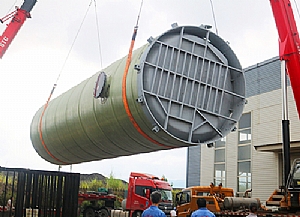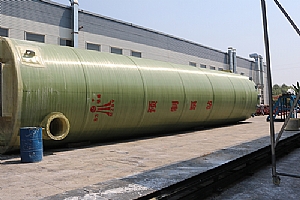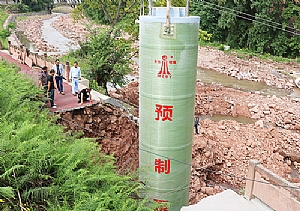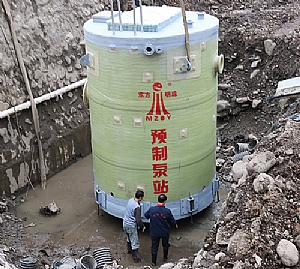What are the requirements of a pumping station?
A pumping station is a crucial infrastructure component in various water management and distribution systems. These facilities are essential for moving water, sewage, and other fluids across distances and elevations where gravitational flow alone is insufficient. Properly designed and maintained pumping stations ensure the efficient and reliable operation of municipal, industrial, and agricultural water systems. This article outlines the key requirements for a pumping station, covering design, operational, and maintenance aspects. Additionally, we introduce PEARL Pump, a leading supplier of customized pumping stations in China.
Design Requirements
1. Capacity and Flow Rate
Hydraulic Analysis: Conduct a thorough hydraulic analysis to determine the required capacity and flow rate. This ensures the pumping station can handle peak demand and maintain adequate service levels.
Future Expansion: Design with future expansion in mind, considering potential increases in demand and system modifications.
2. Location and Accessibility
Optimal Placement: Choose a location that minimizes energy consumption and operational costs. Proximity to the water source and the distribution area is crucial.
Accessibility: Ensure the site is easily accessible for routine maintenance and emergency repairs. Consider road access, especially for large equipment transport.
3. Structural Integrity
Robust Construction: Use high-quality materials to ensure structural integrity and durability. The station should withstand environmental factors, including extreme weather conditions.
Corrosion Resistance: Incorporate corrosion-resistant materials and coatings, particularly in wet and humid environments.
4. Pump Selection
Efficiency: Select pumps that offer high efficiency and are suitable for the specific application, whether it's water supply, sewage, or industrial fluids.
Redundancy: Include redundancy in the design with multiple pumps to ensure continuous operation even if one pump fails.
5. Electrical and Control Systems
Reliable Power Supply: Ensure a stable and reliable power supply, incorporating backup generators or alternative power sources for uninterrupted operation.
Advanced Controls: Implement advanced control systems for monitoring and managing pump operation, including flow rates, pressures, and energy usage.
Operational Requirements
1. Energy Efficiency
Optimized Operation: Use energy-efficient pumps and motors, and implement variable frequency drives (VFDs) to optimize energy consumption.
Regular Monitoring: Continuously monitor energy usage and performance to identify opportunities for improvement and cost savings.
2. Safety and Security
Safety Measures: Implement safety measures such as emergency shut-off systems, alarms, and safe access points for maintenance personnel.
Security Systems: Install security systems to protect the facility from vandalism and unauthorized access.
3. Environmental Compliance
Regulatory Adherence: Ensure the pumping station complies with local, state, and federal environmental regulations. This includes waste disposal, noise control, and emissions management.
Environmental Impact: Conduct environmental impact assessments to minimize the station’s impact on the surrounding ecosystem.
4. Maintenance and Reliability
Routine Inspections: Schedule regular inspections and preventive maintenance to keep all components in optimal working condition.
Spare Parts and Inventory: Maintain an inventory of critical spare parts to reduce downtime during repairs and maintenance.
Maintenance Requirements
1. Scheduled Maintenance
Preventive Maintenance: Develop a preventive maintenance schedule based on manufacturer recommendations and operating conditions. This includes lubrication, adjustments, and part replacements.
Condition Monitoring: Use condition monitoring techniques such as vibration analysis and thermography to detect early signs of wear and tear.
2. Documentation and Records
Maintenance Logs: Keep detailed records of all maintenance activities, including dates, performed tasks, and observations.
Performance Data: Collect and analyze performance data to track the efficiency and reliability of the pumping station.
3. Training and Staffing
Skilled Personnel: Ensure that staff are adequately trained in the operation and maintenance of the pumping station. This includes understanding the control systems and emergency procedures.
Ongoing Training: Provide ongoing training and professional development to keep staff updated on the latest technologies and best practices.
PEARL Pump: Your Customized Pumping Station Supplier
PEARL Pump is a leading supplier of customized pumping stations in China. We offer comprehensive solutions tailored to meet the specific needs of our clients, ensuring optimal performance and reliability.
Customized Solutions: At PEARL Pump, we understand that each project has unique requirements. We provide tailored pumping station solutions to meet your specific demands, whether for water supply, sewage, or industrial applications.
Quality Assurance: Our products are manufactured using high-quality materials and advanced technology, ensuring durability and long-term reliability. Each pumping station undergoes rigorous testing to meet our stringent quality standards.
Comprehensive Support: We offer complete support, from initial consultation and design to installation, commissioning, and ongoing maintenance. Our team of experts is dedicated to ensuring your pumping station operates efficiently and reliably.
For more information on our customized pumping station solutions and to inquire about pricing, please contact us:
PEARL Pump China Pumping Station SupplierSupport Customization
Skype: +8615013488376
Whatsapp: +8615013488376
Email: shangzhengze@gmail.com
The requirements of a pumping station encompass design, operational, and maintenance considerations to ensure efficient and reliable performance. Proper planning and implementation are essential to meet capacity needs, ensure structural integrity, maintain energy efficiency, and comply with environmental regulations. PEARL Pump offers customized solutions for pumping stations, providing high-quality products and comprehensive support to meet the specific needs of various applications. With PEARL Pump, you can be confident in the reliability and efficiency of your pumping station, tailored to your unique requirements.
- What pumps do chemical industry use?[ 2024-05-20 ]
- What is the difference between high pressure and low pressure pumps?[ 2024-05-23 ]
- What is the difference between a centrifugal pump and a screw pump?[ 2024-04-26 ]
- How long does it take to build a pump station?[ 2024-06-05 ]
- What is the difference between a gear pump and a screw pump?[ 2024-04-26 ]
- What Does an Oil Pump Do?[ 2024-04-26 ]
- How does a sewage lift pump work?[ 2024-05-09 ]
- What are the different types of water systems in buildings?[ 2024-04-10 ]
- How long does a water pump last on a diesel engine?[ 2024-05-10 ]
- How much does it cost to build a pump station? [ 2024-05-08 ]
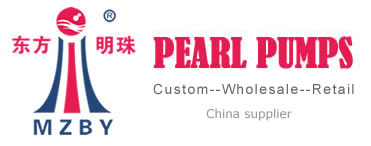

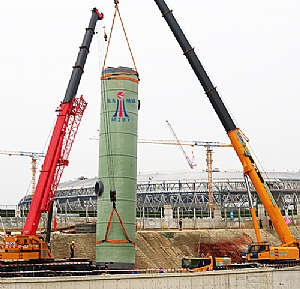
![[Wetland Park] FRP prefabricated pumping station](/UploadFiles/20191129134837863_s.jpg)
